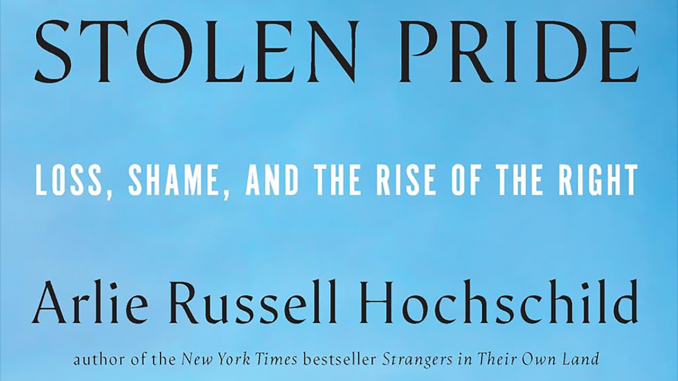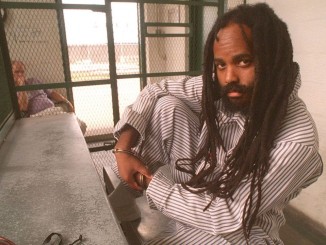
In her many books, sociologist Arlie Russell-Hochschild has emphasized the role that human emotions play as people interact with the larger world around them. Whether bringing to light the effects that work and economic necessity have on the family and gender roles or connecting human feelings of loss to the rise of the political right, Russell-Hochschild listens carefully to her sources, and helps us understand why they feel the way they feel, and how that affects their political orientation.
In her latest book, Stolen Pride: Loss, Shame, and the Rise of the Right, she focuses again on how emotions have fed the rise of the reactionary right in U.S. politics. In contrast to Strangers in Their Own Land, her earlier excellent book on the rise of the Tea Party movement, Stolen Pride examines far more concretely the role of economic forces in creating the thoughts and feelings that have been essential in the rise of the Trump reaction over the past ten years.
In the first portion of the book, Russell-Hochschild introduces us to the dozen or so people who she interviewed, carefully and empathetically telling us their stories and their struggles. She also introduces us to a concept she calls the pride paradox. This paradox exists, she argues, when people have been told and come to believe that their sense of self and their sense of pride are derived from hard work, ability to adapt, and skill and talent, that then lead them to economic success. She shows, using public opinion polls and the words of her informants, that more workers in traditionally Republican dominated regions and states tend to be more firmly attached to the belief that personal hard work and responsibility are the primary factors leading to economic success, and therefore pride and dignity.
But at the same time, the ability of many workers in those same regions (in this case Appalachian Kentucky) to get jobs, and their ability to use their skills and talents to gain economic success, has been eroded or outright ripped away from them by the closure of the coal mines where they used to work and the resultant decline of the local economies that once offered them a road not only to at least some level of economic stability, but also to a sense of dignity and pride. “So what happens,” she writes, “when workers are exhorted to believe that capitalism needs no government hand and that each individual working in it bears personal responsibility for how well or how poorly he or she fares – and then companies pull out?” In other words, what happens when working people have been bombarded for decades with a falsehood that claims that they can control their own economic destiny, and then that falsehood collides with the painful realities of capitalism. This question then guides the rest of the book.
A large part of the answer to that question, of course, is that many people blame themselves for their economic circumstances. She describes in painful detail how a few of her informants sunk into states of depression and despair after the loss of jobs or businesses, and then some of their falls into economic destitution, drug addiction, and the jail cell. While each story is different, the emotional journeys that most of her interviewees went through can be attributed direcly to economic loss.
She then describes, as she did so well in Strangers in Their Own Land, how social and cultural factors (being mocked as hillbillies, being told they are privileged or racist, being laughed at for lack of education) fed into a sense of anger, even rage, at those they perceived to be in positions of privilege or power (so called cultural elites, coastal elites, urbanites and Democratic politicians). In one particularly impactful section, she describes how a white worker felt about being considered privileged, even though they were well aware that some Black capitalists (Oprah Winfrey in this case) have billions of dollars in wealth. Under these conditions, a sense of shame, rage, and victimization combined to enable another type of elite, political manipulators like Donald Trump (who dishonestly poses as a victim of the mostly Democratic cultural elites) to gain their sympathy and then win their support. These dynamics, as we now know far too well, have enabled a billionaire capitalist who has spent his whole life exploiting workers to win the support of millions of those same workers.
If the book only painted this picture, we could obviously give up all hope, give in to raw cynicism, and just watch as we slide further towards reaction. But in her descriptions of the complex and sometimes contradictory views of her informants, she also gives us reasons to believe that we can break out of this current predicament in which some poor and working-class people support their oppressors and continue the rightward spiral.
One of those she interviewed was totally aware that neither political party was really his friend. “All the Democrats care about is color identity, gender, and sexual identity,” he said. “So I’m not a Democrat. All the Republicans care about is patriotism and taxes. A lot of them are racist or rich, don’t believe social class exist, give me bootstrap stuff. So I don’t fit there either. And the politicians on both sides take money from the super-rich.”
The same informant explained how both Black and white working people were very obviously in the same class boat: “On the news you hear a lot about race, but not a thing about poverty…If you look at a white trash person and a ghetto trash person – there’s no difference… Bad jobs, if any. Drug addiction… Crime and jail. Ripped up families. Fights… Cops are harsh here like the cops are harsh in Detroit. A lot of them [Detroit residents] are on government assistance; so are we. Blacks scam the government; we scam the government.”
Another also recognized the common elements of class that affected workers across racial and ethnic groups. “There’s a connection to Blacks a lot of whites around here don’t see. Coal companies took our labor, blackened our lungs, killed guys like my grand-dad, messed up the water, and cut out with the profits.”
Another interviewee, who had after years of struggle managed to become financially stable, not only recognized the class commonalities between people of different races and regions, but also pointed to the root of the problem and the anger he felt towards it:
I understand what Detroit has gone through. What happened wasn’t their fault. And when nobody is coming to help you, I can understand getting mad at the world. And then Black people are getting killed by cops in the street. I get that too. But then eastern Kentucky wants to stand up and say, We’ve been forgotten too… I felt like forces were pushing me and others to whatever edge we’re close to. You feel like something out there is designed to keep you down. There’s no specific person to get mad at. But I start thinking, whatever system is in charge here, I hate it and want to throw it out.
Many recognize clearly that the system is rigged, and that the economic and political forces that shape their world are oppressing not only themselves, but many like them.
She goes on to show how things many of her informants have valued – jobs, a decent income, recognition of skill and expertise, sense community, and more – have actually gone missing. Or, to some, they feel they have been stolen.
As in all her books, Russell-Hochschild traces in great detail these emotional forces and processes. In this book though, more than in her others, she makes clear that the losses didn’t just happen magically or in the realm of psychology and emotion. These losses occurred because of capitalism, and the emotions and political choices people felt and have made were driven by economic factors.
This rich and moving book is well worth reading for anyone who cares about the working class and its trajectory in the United States. She reminds us to listen to and to try to understand people and why they think and believe what they do. And she admonishes us to not shame people for where they are, who they are, or what they believe and think and support politically. That, she makes clear, is part of what has led us to our present predicament.
But beyond that, she leaves what is to be done up to us.
We need to bridge the gaps that she so sensitively highlights. We all need to understand more clearly that pulling oneself up by the bootstraps is unrealistic on a large scale in a capitalist world designed to exploit us. We need to step away from the shame brought on by the pride paradox. And we need to direct our anger toward the real causes of our misery and loss of pride – the capitalist class, with their banks and corporations and politicians who do their bidding. Only then will we be able to move towards getting rid of them and ridding ourselves of the pride paradoxes, the shame and resentment, and the misery and suffering that capitalism has forced on us.




